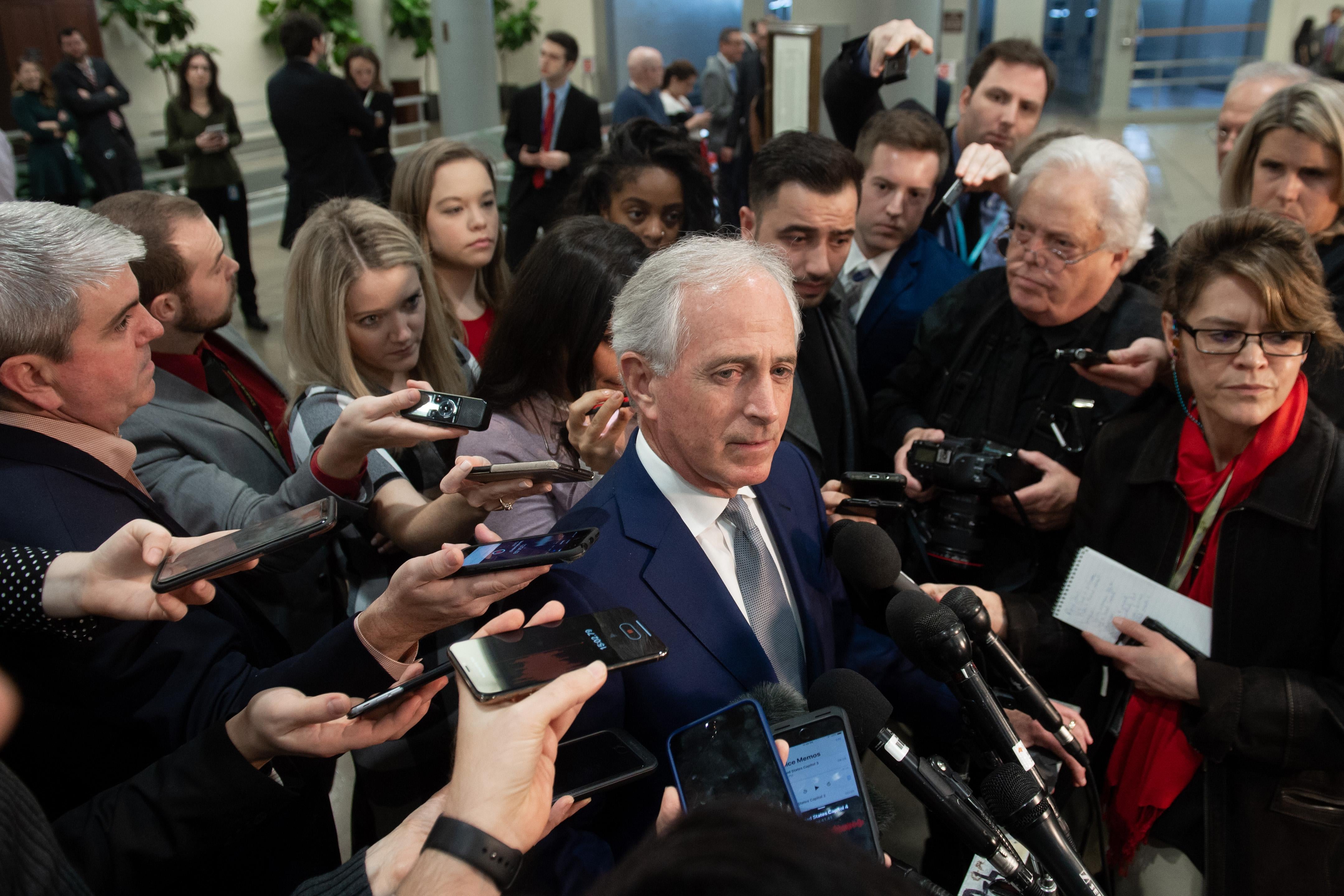A significant slice of Donald Trump supporters are just fine with the president getting primaried in 2020. A new Des Moines Register poll found that while two-thirds (67 percent) of registered Republicans in Iowa say they would “definitely” vote to re-elect Trump if the election were held today, nearly as many (63 percent) say their party should “welcome” challengers in the state’s first-in-the-nation GOP nominating contest 14 months from now.
The paper and its polling partners unveiled the survey Sunday evening, only a few hours after a pair of Republican senators suggested that they, too, are open to the president facing a primary opponent—while also avoiding saying whether they’d actively support such an effort. “I see nothing wrong with challengers; that is part of our democratic system,” Maine Sen. Susan Collins said during an appearance on CNN. “We’ve got to remember what the Republican Party is,” Tennessee Sen. Bob Corker told MSNBC. “What is happening right now is not the standard Republicanism that we’ve had in our country for many, many years.”
The moral and conservative cases for challenging Trump are straightforward: The former centers around his kleptocratic, authoritarian, and racist tendencies; the latter around his conservative apostasy on everything from free trade to foreign policy. This explains the clear appetite among some on the right for a competitive 2020 nominating contest. The unavoidable problem, however, is that a hypothetical challenger’s path to victory is nearly impossible to imagine—despite Trump’s serious legal peril, with Robert Mueller investigating nearly everything he’s ever touched as a businessman, philanthropist, politician, and president.
For one thing, Trump has a massive head start on any and all comers from within his party, even by presidential standards. He officially began his quest for a second term the very same day his first began. He hired a campaign director roughly a year later. He’s raised more than $100 million and counting for his re-election campaign, about 50 times what President Obama had in the bank at a comparable point in 2010. And the Republican National Committee has already taken steps to clear his path to the nomination, including a decision to eliminate its debate committee, which suggests the party won’t sanction any primary debates next year.
Then there’s the issue of who, exactly, could defeat Trump in a GOP primary. Consider potential hopefuls like Corker and Sen. Jeff Flake, both of whom spent much of the past two years exchanging harsh words with Trump while doing little if anything to stop his actions: Both opted against running for re-election to the Senate in 2018 because they feared their rhetorical opposition to Trump would sink them in a GOP primary. If Flake didn’t think he could defeat a Trump-endorsed Martha McSally in the Arizona primary and Corker didn’t think he could hold off Trump-backed Marsha Blackburn in Tennessee, it’s baffling why anyone would believe they could take down the real thing in a presidential primary in their own back yards—let alone in the 49 other states where these soon-to-be ex-senators are far less familiar and connected.
What about Mitt Romney? After happily accepting Trump’s endorsement in 2012, he then emerged as the mouthpiece for the Never Trump movement in 2016, calling Trump a “phony” and a “fraud” and urging Republicans to nominate anyone else, by any means necessary. After Trump won the general election, though, Romney publicly auditioned to be Trump’s secretary of state, then resumed criticizing him after he didn’t get the gig, and later came full circle by accepting Trump’s endorsement for the U.S. Senate. That’s no foundation for a credible primary challenge.
John Kasich can lay claim to being the most clear-cut Never Trumper still standing, but that has come at a cost. One survey from this spring suggested that Trump would defeat the outgoing Ohio governor in a hypothetical head-to-head matchup in the Buckeye State by more than a 2-to-1 margin. If Kasich can’t win at home, he’s not going to fair better on the road.
A Nikki Haley campaign would be the most intriguing challenge, if for no other reason than we haven’t seen her confront Trump directly in the way other could-be candidates already have. But unlike the other names that have been bandied about, Haley would be a stronger candidate in 2024 than in 2020, and she seems unlikely to challenge the president. Just witness how carefully the U.N. ambassador has parted on good terms with Trump.
Then there’s the question of what a primary challenge would even look like. Attacking Trump from his right is more or less impossible but only marginally more so than posturing as some sort of anti-establishment moderate who plays by the rules—that’s a political brand with no modern precedent and no obvious base in today’s GOP.
The most obvious strategy would be to hit Trump for being corrupt, but there’d be no wiggle room there. A candidate couldn’t simply argue that the allegations of corruption are credible enough that the party should nominate someone else for the good of the country. The Brett Kavanaugh fight made clear the power of the conservative persecution complex, which demands that all conservatives are innocent in the court of public opinion until proven guilty in a court of law. Trump has already harnessed that defensiveness to cry “witch hunt” and to convince a clear majority of GOP voters (71 percent, according to one recent poll) that Mueller’s probe is politically motivated. Instead, any Trump challenger would have to go all in, arguing that he or she believes everything the Mueller investigation concludes. But conservative voters have been primed by the Republican Party and their media allies to believe that any evidence of Trump wrongdoing is “fake news”—or that even if it isn’t, that wrongdoing doesn’t matter or isn’t really illegal. Convincing the GOP electorate otherwise, then, would mean insisting that not only is the president corrupt, the rest of the Republican Party has been complicit. That’s hardly the way to win a GOP primary.
